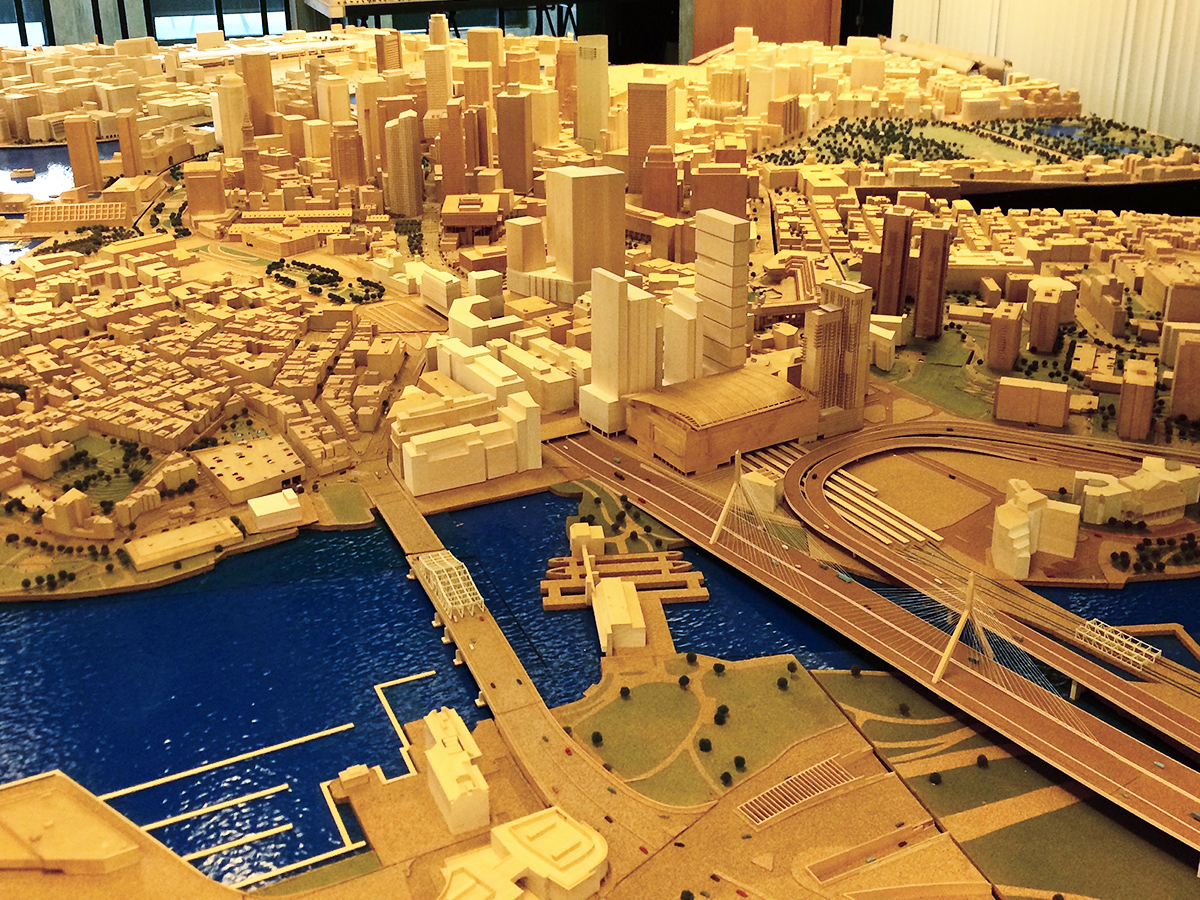Urban Renewal Goes on Trial at City Council Hearing on BRA Extension

The BRA’s models of Boston. / Photo by Kyle Clauss
The Boston Redevelopment Authority faced the latest obstacle in its quest for a 10-year extension on its urban renewal powers, answering questions posed by a skeptical Boston City Council Thursday morning.
“From my perspective, there is a strong reason why the legislation for urban renewal was written with an expiration date and a sunset clause,” Council President Michelle Wu said. “Because these tools are extraordinary governmental tools, giving the BRA additional authority above and beyond the normal set of planning and development tools, we have to be very careful about matching our authority to the need, and it needs to be as narrowly tailored as possible.”
Urban renewal, which allows the BRA to acquire properties under eminent domain and issue tax breaks for developers in 14 designated areas across Boston, suffers from an enduring image problem, one that the building authority’s leadership has worked tirelessly over the last year to rehabilitate. As part of its public “listening tour,” director Brian Golden issued a formal apology at the West End Museum in September, assuming full responsibility for the BRA’s policy of “slum-clearance” that destroyed the immigrant neighborhood in the 1950s.
“We didn’t engage in all these conversations for show,” Golden told the Council. “We engage in these conversations to learn, to receive substantive feedback, and to incorporate them into our future activities and plans. We’ve listened, and we’ll adapt our approach to urban renewal going forward.”
Councilor Tito Jackson, who opposes the 10-year extension, was less than impressed, telling Golden that “outreach and real engagement are not the same.”
The BRA, like its contemporaries across the country, gained the urban renewal powers in the wake of World War II with the passage of the federal Housing Acts of 1949 and 1954, which provided federal funding for the acquisition of properties deemed “slums” and attractive, government-backed mortgages for developers.
“Have urban renewal powers gone away in other cities in the United States of America?” Jackson asked, receiving a “yes” from the BRA’s counsel. “So, why is it so hard for us to figure out what happens when the urban renewal powers go away?”
Councilor-at-Large Michael Flaherty, the only member of the Council present the last time the agency sought a 10-year extension, questioned whether the BRA would ever relinquish its urban renewal powers.
“Does the BRA envision a day when the urban renewal will no longer be needed, that you won’t need those tools? Is it in the BRA’s DNA, at some point, to give up urban renewal or is this something that will continue to morph? Hypothetically, if you’re fortunate to get the votes for the 10-year extension, are we going to be back here in 10 years looking for an extension on the same 14 [areas]?”
“A lot of people would argue no bureaucracy negotiates itself out of existence. No bureaucracy willingly surrenders authority,” Golden said. “I think that is sort of a textbook, you know, ‘Intro to American Government’ kind of assumption, and I think by-and-large that assumption, learning from history, is correct…I think this is different for a variety of reasons.
“We recognize political reality, but it’s also a matter of choice. Philosophically, and from a policy standpoint, I don’t think, 10 years from now, we will see a need for these districts as they are currently constituted. … What may be in front of you 10 years from now will be a radically different proposal—maybe some remnants of these urban renewal districts…tailored, shrunk to deal with very focused, surgical realities.”
In advocating for the extension, Mayor Marty Walsh’s economic development chief John Barros recalled his time in Roxbury, part of Jackson’s district, and “a part of Boston that needed a catalyst.”
“I spent the last 25 years of my life, first starting at the age of 14, dedicating time in my neighborhood in Roxbury to try to revitalize a neighborhood that had been disinvested,” Barros said. “In fact, there were some illegal profits made by arson, and we turned that neighborhood around, in partnership with the BRA and the City, because of urban renewal powers.”
Walsh, meanwhile, sent a letter to the Council urging the body to approve the extension, calling urban renewal an “essential part of our success.”
“In this administration, we want to maintain a sound fiscal position for the city, but it is our priority to do so in a way that enables everyone to succeed and stay in Boston,” Barros said. “We are pursuing growth without displacement.”
“These tools, as you say, can create additional opportunities and increase economic development, but they also supersede community feedback in a lot of cases, as they gave in the past, and they provide the ability to expedite processes, often at the expense of fuller conversation with the community,” Wu told Barros. While she opposes a 10-year extension, Wu said she’d be open to a shorter term with more oversight and regular reports.
The hearing saw testimonies from the Fenway Civic Association, Alliance of Downtown Civic Associations, and Chinese Progressive Association, which oppose the 10-year-extension, as well as the HYM Investment Group, a developer, which supports it.

